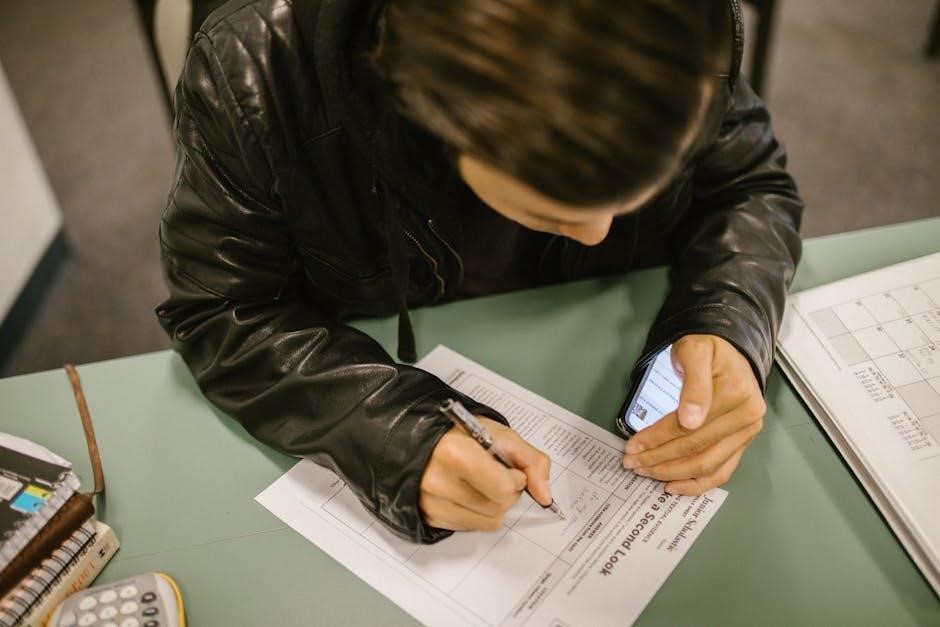The PA Notary Public Test is an essential exam for individuals seeking certification‚ covering Pennsylvania notary laws‚ ethics‚ and procedures. It ensures professionals are qualified to perform notarial duties accurately and ethically‚ adhering to state-specific regulations. Preparation is crucial‚ as the exam assesses knowledge of legal standards‚ document authentication‚ and professional responsibilities. Passing the test is a key step toward becoming a certified notary public in Pennsylvania‚ enabling individuals to serve the public effectively and maintain legal compliance.
Overview of the Importance of the Test
The PA Notary Public Test is crucial for ensuring individuals understand their legal responsibilities and duties as notaries. It verifies their knowledge of Pennsylvania notary laws‚ ethics‚ and procedures‚ which are essential for maintaining public trust and preventing legal issues. Passing the test demonstrates competence in handling documents‚ authenticating signatures‚ and adhering to state-specific regulations. It also ensures notaries can serve the public effectively‚ making it a vital step in becoming a certified notary public in Pennsylvania.
Why Preparation is Key
Preparation is essential to master the PA Notary Public Test‚ as it ensures a thorough understanding of notary laws‚ ethics‚ and procedures. The exam covers critical topics like document authentication‚ legal standards‚ and professional responsibilities; Without proper preparation‚ candidates may struggle with complex questions and state-specific regulations. Utilizing study materials‚ such as practice tests and flashcards‚ helps identify weaknesses and build confidence. Adequate preparation not only improves test performance but also ensures notaries can fulfill their duties accurately and ethically‚ avoiding legal complications and maintaining public trust.
Eligibility Requirements for Becoming a PA Notary Public
To become a PA Notary Public‚ candidates must be at least 18 years old‚ reside or work in Pennsylvania‚ and be a U.S. citizen or permanent resident. They must also demonstrate the ability to read and write English and pass a background check. Meeting these eligibility criteria ensures candidates are qualified to perform notarial duties responsibly and in compliance with state laws.
Age and Residency Requirements
To qualify as a PA Notary Public‚ applicants must be at least 18 years old. Additionally‚ they must either reside in Pennsylvania or work within the state. Residency requirements ensure a strong connection to the state‚ while the age criterion guarantees legal adulthood. These basic eligibility standards are non-negotiable and must be met before proceeding with the application and exam process. They are designed to uphold the integrity and accountability of notary services in Pennsylvania.
Citizenship and Language Proficiency
Applicants must be U.S. citizens or permanent residents to qualify as a PA Notary Public. Additionally‚ they must demonstrate the ability to read and write English proficiently. This ensures effective communication and accurate execution of notarial duties. Language proficiency is critical for understanding legal documents‚ ethical responsibilities‚ and proper procedures. Meeting these criteria is essential for upholding the integrity of notary services in Pennsylvania. These requirements align with state laws and professional standards‚ ensuring competent and reliable notary public services.
Background Check and Application Process
A thorough background check is required to ensure applicants have a clean criminal record. This step is crucial for maintaining public trust in notary services. The application process involves submitting required documents‚ including proof of residency and citizenship. Applicants must also pass the notary exam and complete a background check before being approved. This rigorous process ensures only qualified individuals become certified notaries‚ upholding professional and ethical standards in Pennsylvania. A clean record and proper documentation are essential for a successful application.
Understanding the Exam Format
The PA Notary Public Test is a multiple-choice exam focusing on notary laws‚ document handling‚ and ethical practices. It assesses knowledge of Pennsylvania-specific regulations and procedures.
Question Types and Structure
The PA Notary Public Test features multiple-choice questions designed to assess knowledge of Pennsylvania notary laws‚ document authentication‚ and ethical responsibilities. Questions are structured to evaluate understanding of legal standards‚ practical scenarios‚ and procedural requirements. The exam includes scenario-based questions to test application of notary practices‚ ensuring candidates can handle real-world situations effectively. The format is straightforward‚ with clear instructions‚ making it easier for candidates to demonstrate their competency in notary services.
Time Limit and Passing Score
The PA Notary Public Test is timed‚ with candidates typically having 60 minutes to complete the exam. The passing score is 80%‚ requiring correct answers to at least 80% of the questions. Time management is crucial‚ as the exam assesses both knowledge and ability to apply it efficiently; Understanding the time limit and scoring system helps candidates prepare effectively‚ ensuring they allocate sufficient time to each question and review their answers before submission.

Study Materials for the PA Notary Exam
Recommended study materials include textbooks‚ online guides‚ and practice tests with verified answers. These resources cover Pennsylvania notary laws‚ ethics‚ and procedures‚ ensuring comprehensive preparation.
Recommended Textbooks and Guides
Pennsylvania Notary Law and Practice is a top-recommended textbook‚ offering in-depth insights into state-specific regulations. The Notary Public Handbook provides comprehensive guides‚ practice questions‚ and summaries of ethical standards. Additionally‚ downloadable PDF resources like “PA Notary Exam Questions and Answers” are widely used for targeted preparation. These materials cover essential topics such as document authentication‚ RULONA guidelines‚ and professional responsibilities. They are designed to help candidates master the exam content and understand the practical applications of notary duties in Pennsylvania.
Online Resources and Practice Tests
Online platforms like Docsity offer downloadable PDFs with practice questions and verified answers‚ simulating real exam conditions. Websites such as Quizlet provide flashcards and study guides tailored to Pennsylvania notary laws. Additionally‚ resources like PAN’s RULONA Test Preparation video and practice exams help candidates familiarize themselves with the test format. These tools enable focused study‚ allowing individuals to identify weak areas and improve their understanding of key concepts. They are invaluable for efficient and effective exam preparation.
PA Notary Practice Tests and Answers
PA Notary Practice Tests and Answers provide essential exam preparation‚ featuring questions covering Pennsylvania-specific laws and procedures. These resources help candidates assess their knowledge and identify gaps in understanding‚ ensuring readiness for the actual exam. Verified answers and explanations are included to aid in effective learning and improvement.
Benefits of Using Practice Tests
PA Notary practice tests offer numerous benefits‚ including familiarization with exam formatting and content. They help identify knowledge gaps‚ allowing targeted study. Timed simulations build time management skills‚ reducing exam-day anxiety. Practice tests also enhance retention of key concepts and reduce stress. With verified answers‚ users gain clarity on correct responses and understand reasoning behind each question. Regular use of practice tests significantly improves confidence and readiness for the actual Pennsylvania Notary Public Exam.
How to Interpret Answers and Feedback
Interpreting answers and feedback from PA Notary practice tests is crucial for effective preparation. Correct answers provide clarity on expected responses‚ while explanations reveal the reasoning behind each question. Analyzing incorrect answers helps identify knowledge gaps and common errors. Feedback highlights areas needing improvement‚ guiding focused study. By reviewing explanations‚ candidates can strengthen their understanding of Pennsylvania notary laws and procedures. This process enhances retention and ensures better performance on the actual exam‚ fostering confidence and competence in notarial duties.
Key Topics Covered in the Exam
The PA Notary Public Test covers Pennsylvania notary laws‚ document authentication‚ ethics‚ RULONA guidelines‚ and state-specific regulations‚ ensuring comprehensive knowledge for effective notarial practice.
Pennsylvania Notary Law Basics
Pennsylvania Notary Law Basics cover essential principles governing notarial duties‚ including document authentication‚ witness requirements‚ and ethical conduct. The Revised Uniform Law on Notarization (RULONA) provides guidelines for modern notarization practices. Key topics include the role of notaries in verifying identities‚ administering oaths‚ and ensuring document integrity. Understanding these laws is crucial for performing notarial acts correctly and avoiding legal issues. Proper adherence to state-specific regulations ensures public trust and maintains the integrity of notarial services in Pennsylvania.
Document Handling and Authentication
Document handling and authentication are critical skills for PA notaries‚ ensuring the legitimacy and accuracy of signed documents. Notaries must verify signers’ identities‚ witness signatures‚ and affix official stamps or seals. Proper handling involves maintaining clear records of notarized acts‚ while authentication confirms the document’s integrity. Understanding these procedures is vital for accurately answering exam questions and performing duties ethically. Mastery of document authentication ensures compliance with Pennsylvania’s legal standards and upholds public trust in notarial services.
Ethics and Professional Responsibilities
Ethics and professional responsibilities are cornerstone principles for PA notaries‚ emphasizing impartiality‚ confidentiality‚ and integrity. Notaries must avoid conflicts of interest‚ ensure transparency in transactions‚ and adhere to Pennsylvania’s legal and ethical standards. They are also required to report any violations of the law. Upholding these principles ensures public trust and maintains the integrity of notarial services. Understanding ethical duties is essential for answering exam questions accurately and performing notarial acts responsibly.

Common Mistakes to Avoid
Common errors include misunderstanding legal standards‚ improper document handling‚ and poor time management. Ensure accurate answers and allocate time wisely to avoid these pitfalls during the exam.
Understanding Common Errors in Answers
Common errors in PA Notary test answers often stem from misunderstanding legal standards or procedural requirements. Many candidates incorrectly interpret notary responsibilities‚ such as administering oaths or authenticating documents. Others struggle with RULONA guidelines‚ leading to inaccurate responses. Analyzing these mistakes is crucial for improvement. Reviewing explanations for incorrect answers helps identify knowledge gaps and strengthens understanding of key concepts. Focusing on areas like document handling and ethical practices can significantly reduce errors and enhance overall performance on the exam. Proper preparation is essential to avoid these pitfalls.
Strategies to Improve Test Performance
To enhance performance on the PA Notary Public Test‚ focus on timed practice tests to simulate exam conditions. Review incorrect answers thoroughly‚ identifying knowledge gaps and understanding the reasoning behind correct responses. Prioritize studying RULONA guidelines and state-specific laws‚ as these are common areas of difficulty; Regularly revisit challenging topics and consider joining study groups for collaborative learning. Consistent practice and a structured study plan are key to improving accuracy and confidence‚ ensuring readiness for the actual exam.
Time Management During the Exam
Allocate time wisely during the PA Notary Public Test by spending no more than one minute per question. Use practice tests to build speed and accuracy‚ ensuring you complete all questions within the allotted time. Prioritize answering easier questions first to secure partial credit‚ then return to challenging ones if time permits. Effective time management is crucial for maximizing your score and reducing exam stress.
How to Allocate Time Effectively
Start by skimming the entire exam to gauge the difficulty of questions. Allocate 1 minute per question‚ reserving 5-10 minutes for review. Begin with straightforward questions to secure easy points‚ then tackle complex ones. Avoid spending too much time on a single question—mark it for later review. Use practice tests to refine your pacing and identify time-consuming areas. Prioritize questions with higher confidence first‚ ensuring you maximize your score within the allotted time. Stay calm and systematic to maintain focus and efficiency.
Techniques to Reduce Stress
Deep breathing exercises can help calm nerves before and during the exam. Practice mindfulness to stay focused and avoid anxiety. Prioritize questions‚ tackling easier ones first to build confidence. Stay hydrated and well-rested to maintain mental clarity. Visualize success to boost positivity. Use short breaks between sections to refresh your mind. Remember‚ preparation is key—trust your knowledge and approach each question methodically. A positive mindset and systematic approach will help you manage stress and perform at your best during the test.
Using Flashcards for Quick Revision
Flashcards are an excellent tool for quick revision‚ helping memorize key terms and concepts efficiently. They are portable‚ allowing study anywhere‚ and support self-testing for better retention.
Creating Effective Flashcards
Effective flashcards should focus on key concepts and definitions from the PA Notary Public Test. Use clear‚ concise language and include relevant questions and answers from practice exams. Organize cards by topics like notary law‚ ethics‚ and document handling. Incorporate color coding or symbols to highlight important information. Regularly review and update your flashcards to ensure they reflect the latest exam content and your understanding of the material. This method enhances retention and prepares you for quick recall during the test.
Reviewing Key Terms and Concepts
Reviewing key terms and concepts is essential for mastering the PA Notary Public Test. Focus on notary-specific terminology‚ such as “acknowledgment‚” “affidavit‚” and “jurat.” Use flashcards to memorize definitions and procedures‚ ensuring a strong foundation in Pennsylvania notary law. Pay attention to ethics and professional responsibilities‚ as these are heavily tested. Regularly revisit and update your flashcards to reinforce learning and improve retention. This active recall method helps identify gaps in knowledge and solidifies understanding of critical concepts.
Additional Resources for Preparation
Utilize online courses‚ tutorials‚ and study groups for comprehensive exam prep. Explore PAN resources‚ including the RULONA Test Preparation video‚ to enhance your understanding and readiness.
Online Courses and Tutorials
Enroll in online courses and tutorials designed to prepare for the PA Notary Public Exam. These resources offer structured learning‚ covering Pennsylvania notary laws‚ ethics‚ and professional responsibilities. Many courses include practice questions‚ flashcards‚ and detailed explanations to enhance understanding. Platforms like Tableau Public and specialized notary preparation sites provide interactive tools to simulate exam conditions. Additionally‚ resources such as the RULONA Test Preparation video by PAN help candidates grasp complex topics. These courses ensure a comprehensive and engaging approach to exam readiness.
Study Groups and Forums
Joining study groups and forums connects you with fellow candidates preparing for the PA Notary Public Exam. These platforms foster collaborative learning‚ allowing participants to discuss challenging topics‚ share study materials‚ and gain insights from others. Many forums‚ such as those on Docsity or Quizlet‚ offer access to practice questions and answers‚ enabling interactive discussions. Active participation helps identify knowledge gaps and reinforces understanding of key concepts like Pennsylvania notary law and professional ethics‚ ultimately enhancing exam readiness and confidence.

Final Tips for Exam Day
Arrive early‚ bring required documents‚ and stay calm. Skim through questions first‚ manage time wisely‚ and review answers before submitting. Avoid last-minute cramming for best results.
What to Bring to the Test Center
Ensure you bring a valid government-issued ID‚ your exam confirmation email‚ and any required documentation. Arrive early to complete check-in procedures smoothly.
Keep electronic devices silenced and accessible for inspection. Avoid bringing prohibited items like notes or unauthorized materials. Stay organized to maintain focus during the exam.
Last-Minute Preparation Strategies
Review practice exams to reinforce knowledge of Pennsylvania notary laws and procedures. Focus on weak areas identified during study sessions. Use flashcards to quickly revise key terms and concepts. Ensure a good night’s sleep before the exam to maintain focus and clarity. Arrive early at the test center to avoid stress. Stay calm and systematically approach each question‚ utilizing the reasoning skills developed during preparation. This strategy ensures optimal performance on the PA Notary Public Test.
The Role of RULONA in Notary Practice
RULONA provides updated guidelines for notaries‚ ensuring compliance with modern standards. It influences test questions‚ focusing on ethical practices and legal requirements‚ and is a key study resource for the PA Notary Public Exam.
Understanding RULONA Guidelines
RULONA‚ or the Revised Uniform Law on Notarial Acts‚ outlines modern standards for notary practices‚ including electronic notarizations and identity verification. It ensures legal consistency and clarity‚ addressing traditional and digital processes. Understanding RULONA is vital for notaries‚ as it impacts how they perform duties like acknowledgments‚ oaths‚ and affirmations. Familiarity with RULONA guidelines is essential for passing the PA Notary Public Test‚ as it frequently appears in exam questions‚ ensuring notaries comply with updated legal requirements and maintain ethical standards in their professional responsibilities.
Applying RULONA in Test Questions
RULONA guidelines are frequently incorporated into PA Notary Public Test questions‚ focusing on electronic notarizations‚ identity verification‚ and updated legal standards. Questions often present real-world scenarios requiring the application of RULONA principles‚ such as determining proper authentication methods or understanding electronic seal requirements. Test-takers must demonstrate their ability to interpret and apply RULONA correctly‚ ensuring compliance with modern notarial practices. Accurate knowledge of these guidelines is essential for answering exam questions confidently and achieving certification as a Pennsylvania notary public.

State-Specific Laws and Regulations
Pennsylvania notary laws include specific requirements for electronic notarizations‚ identity verification‚ and document authentication. Recent updates ensure compliance with modern notarial practices‚ emphasizing state-specific regulations and ethical standards.
Unique Aspects of Pennsylvania Notary Law
Pennsylvania notary law requires notaries to maintain a journal of all notarizations‚ ensuring accountability and transparency. Unlike some states‚ Pennsylvania mandates strict adherence to electronic notarization standards and identity verification processes. Additionally‚ Pennsylvania notaries must refrain from performing duties outside the state unless specifically authorized. These unique aspects emphasize the importance of understanding state-specific regulations to avoid legal complications and ensure compliance with Pennsylvania’s notarial requirements.
Recent Updates and Changes
Recent updates to Pennsylvania notary law include the implementation of RULONA guidelines‚ which standardize notarial practices nationwide. Electronic notarization has also been expanded‚ with stricter requirements for identity verification. Additionally‚ the exam format has been revised to include more scenario-based questions‚ focusing on practical applications of notary laws. Candidates must stay informed about these changes‚ as they directly impact both the exam content and real-world notarial duties‚ ensuring compliance with the latest legal and procedural standards in Pennsylvania.
Importance of the PA Notary Public Exam
The PA Notary Public Exam is crucial for ensuring individuals are proficient in notary laws‚ ethics‚ and procedures. Passing the exam confirms competency‚ enabling professionals to perform notarial duties accurately and ethically‚ upholding legal standards and public trust.
How It Impacts Your Career
Passing the PA Notary Public Exam significantly enhances your career prospects‚ demonstrating expertise in notary laws and ethics. It boosts credibility‚ making you a reliable professional. Employers often prefer certified notaries‚ opening doors to advanced roles. Additionally‚ it allows you to offer notary services independently‚ expanding business opportunities. The certification is a valuable asset‚ ensuring compliance with legal standards and fostering trust with clients. Invest in this exam to elevate your professional standing and unlock new career pathways in various industries requiring notary services.
Long-Term Benefits of Certification
Becoming a certified PA Notary Public offers lasting career advantages‚ enhancing your professional credibility and trustworthiness. It enables you to provide specialized services‚ attracting more clients and increasing earning potential. Certification also ensures compliance with evolving legal standards‚ reducing liability risks. Over time‚ it positions you as an expert in notary practices‚ opening opportunities for leadership roles or starting your own notary business. The certification demonstrates commitment to professional growth‚ making it a valuable long-term investment in your career and future opportunities.

